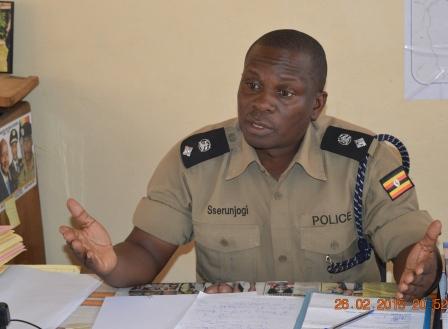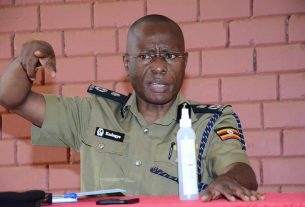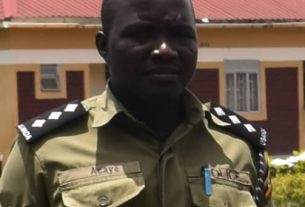While witchdoctors have wracked havoc in many parts of the country, in Naggalama which is arguably the most witch infested area, they have been kept at bay by smart policing.
The police division of Naggalama covers the sub counties Seeta Namuganga, Kyampisi, Nabbale, Nagojje, Ntunda, Kasawo and Kimenyedde. In all these sub counties, 1,930 witch doctors had been officially registered by the beginning of this year. Nakaswa village alone 300 witchdoctors out of the registered 1,930.
But much as they go about their traditional business, these so-called traditional healers are so tightly monitored that no single ritual murder or child sacrifice has been recorded in Naggalamadivision.
The DPC who has been in charge since November 2013, Superintendent of Police John Bosco Serunjogi, knows that to police such a vast but sparsely populated area that is covered by a lot of forests (the previously deforested Mabira has been regenerating in recent years) and sugar plantations, he needs the active participation of wananchi. Moreover, many of the men are migrant workers who come and go from all over Uganda and beyond. So Serunjogi has trained no less than 1,200 crime preventers who are the eyes and ears of the police force in protecting and serving the population of transitional workers and superstitious locals. Still, all the crime preventers and police personnel in Naggalama put together are outnumbered by the practicing witchdoctors.
According to the police findings, seven out of every ten homesteads in Naggalama believe in witchcraft and seek the services of witchdoctors from time time. With majority of the people thus attributing success and failure to good or bad spells, there are countless cases of revenge acts and malicious destruction of property. The 1,930 registered witchdoctors plus many more who have not been registered are therefore very busy with their multi tribal clients. Most people in the area are Baganda, mixing with considerable numbers of Basamia, Bagishu and West Nilers.
DPC Serunjogi has to work closely with the chief “spiritual healer” one Mr Male who is the boss of the witchdoctors in the area and is the recognised representative of Mama Fina, the national head of the ‘traditional healers’ whose mandate was recently renewed by their national association.
Strange as these things may sound, they occupy a lot of police time to ensure that lives are not lost as the traditionalists go about their business. Recently, a bewildered resident from Kimenyedde stormed the DPC’s office crying out that his ‘winds’ (empewo) had been stolen. Serunjogi in jest offered to buy him a fan to give him wind at the flick of a switch but the man was serious and the DPC had to convene a meeting with the man’s clan so that his stolen ‘winds’ could be retrieved and restored to him with the help of Mr Male.
Besides the bizarre but potentially dangerous traditional practices, the area is a smugglers route, as it has roads that run parallel to the eastern international highway. So vehicles on the roads have to be monitored with unduly interfering with legitimate business and travel. The compound of Naggalama divisional headquarters thus has several parked vehicles that are still under query. Some owners simply disappear when their cases are indefensible. One Toyota Noah has been around for a couple of months after its driver fled when a foot patrol discovered that his beautiful co-driver was in fact a goat being transported in the rampant livestock thefts that useNaggalama as a transit area. When police intensified the search of vehicles for stolen livestock that ends up in Kampala’s nyama choma joints, the thieves had started strapping the goats in car seats and tying head-scarfs on them. In the dark such goats could easily be mistaken for long-faced women – as long as they remained quiet of course. It also worked well for the thieves when a few of the goats were made to wear eyeglasses.
Besides the live animals, a lot of meat also transits through Naggalama to the city on lorries that carry sand from Kabimbiri, Seeta Nangunga and Kayunga. The meat of the stolen cattle is simply buried in the sand on the trucks and random searches or those based on tip offs by wananchi have revealed large caches of meat. Many livestock thieves have been apprehended although they often get bail and disappear. Naggalama police also recently managed to arrest a notorious cattle thief, one Mugerwa, but he escaped from remand and is still being hunted.
Land Wrangles
With a highly transient population, Naggalama’s land wrangles are higher than average. Because the area is not densely populated and yet it is near the city (within the Kampala Metropolitan Police area) a lot of land appears quite attractive to people from the city and other parts of the country. And they fall easy prey to the land conmen. There is no age limit to the conmen in this sector. A notorious suspect who is 86 years old quickly gets bail in court on account of his advanced age whenever he gets arraigned for being involved in another land swindle. Because of his age, many land buyers tend to believe him when he claims to be the owner of a piece that his accomplices posing as agents put on the market.
Usually, the conmen do a search in the registry and when they identify a piece of land that was last transferred many years ago, they forge an ID for the old conman in registered owner’s names. They bring the buyer to him and he tells a convincing story along the lines of his being in need of money to seek treatment, having been abandoned by his children.
A number of prominent people from Kampala in search of substantial tracts of land inNaggalama have fallen victim to the old man who poses as a ‘mutaka’ (elder) and his accomplices who sell them ‘air’.
What the Police team of Naggalama is engaging in now in response is intensive sensitization of the people and LCs over rigorous verification of identities and particulars of persons and documents in any proposed land transaction. The customary ‘bibanja’ holders are also highly targeted by city conmen who come claiming to be the title holders and offering to regularize their tenancy by transfer the titles to them for a significant fee.
Community Support
In no small measure, the residents of Naggalama division have supported Uganda Police force in its efforts to reduce crime. When called upon last year, over 1.200 of them turned up for training as crime preventers after being vetted by their neighbours and local leaders. .
Besides volunteering and giving their time in crime prevention activities, residents are also actively involved in setting up police structures in Naggalama division. They have not only donated land and building materials for the construction of police posts, they also provide the labour. From these efforts, Naggalama police division has acquired Nkonge police post, Mayangayanga police post, and Kabimbiri police post which was donated by Mr kalibbala.
Another police post at Kalagi was donated by Mr Bosa the LC 1 chairman. The community has also donated police posts Ndese, Kyampisi and Namaliri. At Nagoji police has been given land. At some of the police posts, the community is also constructing living quarters for police personnel.
From Constable Driver to Divisional Commander
Ten years is what it took John Bosco Serunjogi to rise from a driver constable in the police to a divisional commander, and also earn a university degree along the way. But his earlier life was also a series of diverse experiences that make Serunjogi’s varied career in the force unsurprising. The village island boy from Kalangala did his primary school in the city at Kawempe, curtesy of a brother who had left the islands earlier, to end up doing his secondary education in Kisoro. After doing some carpentry and the dabbling into business, Serunjogi finally joined the police force in 2002 at Kibuli. After basic military training followed by police training his journey in the police force took a new turn when with a group of drivers they underwent specialized training later that year. After training and some general duties, the IOV where he had worked as the driver to the Officer in Charge, then SSP Bagonza for a while, seconded him to the Inspectorate of Government. Since the working hours were quite regular at IGG’s, he registered for a degree course in social Works and Social Administration at the Uganda Christian University, and managed to graduate in 2006.
That is when he thought of applying for the cadet course saying to himself, “Why not?”
Serunjogi was among the lucky few accepted for the course and after the training in 2007, he became an Assistant Superintendent of Police! For someone who had only been a constable, that was a big leap, though he had trained for it and already had the intellectual preparation having done university academic studies. As such, he never went through the junior officer ranks.
The new ASP first worked at Kikajjo Police Post in Katwe Division, then was deployed to open up the station in Makerere University Business School (MUBS) before being selected for a command course in Kabalye, Masindi Police Training School.
At the end of the course came the most crucial and dangerous posting – Nakapiripirit in karamoja where he was the OC station and sector commander for the Anti – Stock Theft Unit between 2010 and 2013.
The Karamoja experience was possibly the most formative in Serunjogi’s career. Out there, teamwork is extremely crucial and cooperation between government agencies is at its highest. Serunjogi sense of community involvement was also sharpened in Karamoja where he found himself initiating basic sanitation from village to village. He banned open air defecation and strictly enforced Universal Primary Education.
Three years in karamoja can make a man’s outlook to life almost entirely different. But the posting came to an end after three years. After vigorously promoting sanitation and education on top of police duties, Serunjogi left Karamoja with only one regret. He had not managed to change the people of Nakapiripirit from their love for being in prison. Many of them even commit crimes with the aim of getting locked up so they can live on free food without having to work.
Back in Kampala, the cop from Karamoja underwent a culture re-orientation during his brief posting at KMP headquarters. The man who had earlier been a VIP driver in the city had to re-learn how to cross busy roads and survived being knocked by cars a couple of times as he crossed from Mapera House to go to CPS.
Then in November 2013, he was posted to Naggalama as the DPC. He found the place so shockingly rundown it wasn’t any more comfortable than Nakapiripirit. The sixty year old station has not had a facelift but the new DPC achieved a lot by enforcing cleanliness. A lot of cooperation has been received from the community. Individuals have chipped in to help theDPC give Naggalama a new lease of life. Haji Umaru Dumba constructed a new toilet block at the division with sh4 million; Mr Sowed Bosa has been paying rent for a post in Kalagi as one was being constructed while Nabbale LC chairman gave a place for construction.
From the operational zones of the previously lawless Karamoja to the witchcraft infested conservative area of rural Buganda, it has been a hectic career for SP John Bosco Serunjogi, a man who speaks nine Ugandan languages fluently, in addition to English and Kiswahilli. The experiences from Karamoja and Naggalama will no doubt help in in his next assignment, wherever and whenever that will be.
Institutions in the area have cooperated significantly, especially those linked to the Catholic Church. These include St Joseph SSS, St Francis Hospital, St Agnes Girls’ School, St Joseph Mixed School, St Joseph’s Parish, The Fathers’ house and the Sisters’ convent.
The LCs are also cooperative to the police
Ends





